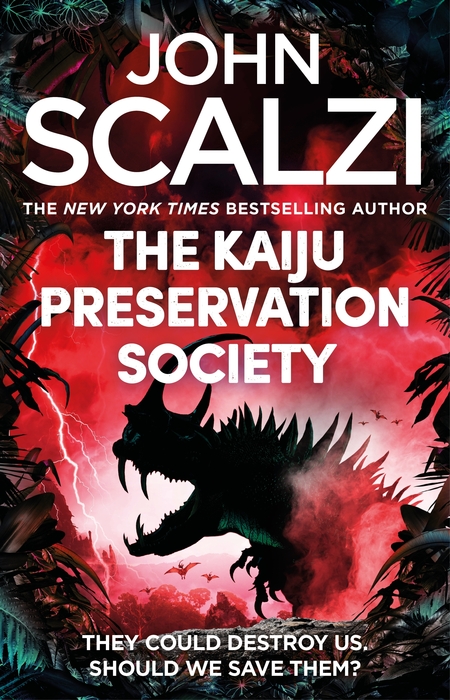Diving headfirst into a novel that promises escapism writ large is one of the best self-care things you can do for yourself.
Most especially when you have an author John Scalzi at the helm who freely admits, with a refreshing honesty that is gloriously uplifting in its intent, that his newest novel, The Kaiju Preservation Society, is a “pop song”, the result of having COVID stymy the finish of the big, intense, sprawling novel he was writing, necessitating a complete change of tack to another story that he says, “dropped into my head, all at once.”
“As a writer, I feel grateful to this novel [The Kaiju Preservation Society aka KPS], because writing it was restorative. KPS is not, and I say this with absolutely no slight intended, a brooding symphony of a novel. It’s a pop song. It’s meant to be light and catchy, with three minutes of hooks and choruses for you to sing along with, and then you’re done and you go on with your day, hopefully with a smile on your face. I had fun writing this, and I needed to have fun writing this. We all need a pop song from time to time, particularly after a stretch of darkness.” (Author’s note and acknowledgements, P. 262)
Preach it brother!
We have endured, and continue to endure a fiercely intense period of time which, apart from COVID, has seen the world grappling with warmongering geopolitics, climate change on fast-forward and a general sense of fascistic menace, the kind that has you looking under the bed, if not for reds, then those wearing hateful black, red and white insignia.
“‘Hi,’ Niamh said, waving.
I waved back. ‘I mean I was doing a dissertation on science fiction novels, so I think I qualify under ‘nerd”
‘Wow, you really do,’ Kahurangi said. ‘And here I thought you were just here for the meat hydraulics.’
‘Oh, I am,’ I said. ‘The failed doctoral dissertation is just a bonus.'” (PP. 29-30)
We definitely need a break from the darkness, and while diving into said absence-of-light makes for grimly beguiling storytelling, the kind which absorbs you, soul depths and all, there is something to be said for a pop songy escapist novel, particularly when they are as well written as The Kaiju Preservation Society.
It is one of those novels which looks deceptively simply on the surface.
Sporting a 1950s cinema serial vibe, replete with monsters, foolish men, greed and self sacrifice, mixed in with some decidedly 21st century commentary on corporatism, the gig economy and yes, the pandemic which shall not be named (except it already has been so horse. bolted.), The Kaiju Preservation Society is a giddy battle between good and evil, where the good guys are scientists capable of zinging, witty dialogue that delights you to the nth degree and the evil people are just cartoonishly bad (but in that way that makes for a robust thrill ride to the gallopingly intense conclusion.
Set in our reality, and also on an alternate Earth where humanity, mammals and reptiles did not evolve but nuclear-powered animals the size of city skyscrapers did, along with a host of dog-eat-dog predators who want us for dinner thank you very much, the novel makes the absolute most of a premise which calls on the multiverse, Godzilla and swashbuckling derring-do for inspiration and adventuring pizzazz.
As pop songs go, The Kaiju Preservation Society is a belter, the sort of tale which zips straight to number 1 because it’s just so damn catchy but which for all its escapist airs, is a mightily substantial entertaining read.
Much like the pop songs of ABBA, which sound simple but are anything but when you dig down into their musical DNA are winningly complex, Scalzi’s latest slice of narrative brilliance gives every indication of being slight and frothy, and welcomingly, wonderfully so for the reasons the author outlines above, before turning out to be a things of remarkably clever beauty.
For a start, he has crafted a suite of characters, mostly on the good side of the equation because the baddies can be one-note and fulfill their role quite perfectly (and they do), chief among them the wisecracking hero of the hour, Jamie Gray, a one-time doctoral candidate who finds her life upended when she’s laid off from the start-up she left academia for only to end up as a gigging food delivery driver (the result of this all happening as the pandemic gets cruelly underway in 2020).
Not quite what she had in mind, and understandably so, and all seems unfulfillingly lost until one of her customers, Tom Stevens offer her the mother monster of all jobs looking after animals for an extremely lucrative payment.
It’s only when Jamie gets to the other Earth – the barriers between our Earth and that of the Kaiju’s has a singularly unique way of being thinned out, allowing entry – that she discovers that the animals are quite a bit bigger than she anticipated, that for all the people who want to look after the Kaiju there are those who would rather profit from them and will do whatever it takes to get their way.
“‘Wait,’ Sanders said, and I could feel him centering himself. ‘You won this round. Fine. Well done. But–if you don’t do this, I could make it worth your while.’
‘Tempting,’ I said. ‘But nope! Also, I’m walking now, and I’m turning off the screamer. You can keep up with me. Or not.’ I started walking. After a second, Sanders followed me. I kept the screamer on the whole time. Even if they won’t kill you, tree crabs are the worst.
As we got to the door, Sanders looked up at the stairs. ‘Isn’t there an elevator?’ he asked.
‘No,’ I said. “no, there is not.'” (P. 177)
Set-up done and dusted, let the execution begin!
And oh my how Scalzi executes on his fantastically original idea with characters who pop off the page, worldbuilding that will have you utterly entranced, exposition that is deeply, expansively rich but never, ever remotely clunky or boring, and dialogue so richly emotionally resonant and laugh-out-loud funny that half the fun is feeling like you’re in an action comedy from the golden days of the ’80s and ’90s.
In fact, it’s the dialogue that powers The Kaiju Preservation Society along and makes it feel so immersively cinematic that you often feel as if you could step into the pages and live the adventure along with Jamie, Aparna, Kahurangi, Niamh and Tom, and a slew of equally compelling supporting characters.
You wouldn’t, of course, because monsters chomp, chomp, chomp, but you really wish you could because this is adventure on a soul-lighteningly grand scale, epic in all the right ways and intimate when that’s needed, with The Kaiju Preservation Society adept at balancing the big and brassy and the thoughtfully nuanced in equal measure.
But at the end of the day, The Kaiju Preservation Society is a pop song, a superbly clever, richly-realised piece of escapist storytelling magic which does entertain the inevitable trope of asking who the monsters really are – pssst! Hint: it’s the Kaiju who just do what comes naturally – but which does so vibrantly and with such intelligence and comedic perfection that you will hang on for every last page of the ride which doesn’t let up for a second until its sensitively good conclusion which closes the door on the story nicely while keeping it open just enough to perhaps make a return visit should the need for more pop singing seize Scalzi in the future.

